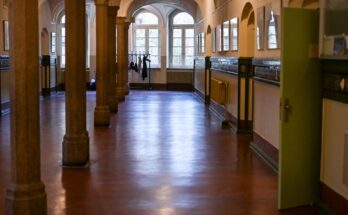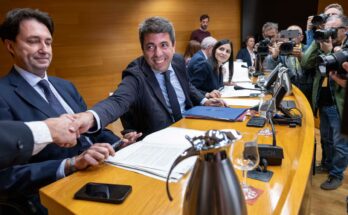In September 2021, in the midst of the pandemic and after half a century of closure, the rural school of Palau de Santa Eulàlia, a small municipality of 130 inhabitants in Alt Empordà (Girona), reopened its doors. Five years later, the center will close because the mayor, Xavier Baldrich, assures that he cannot maintain it and that he wants to recover the building to move the town hall there. The decision divided the city; the teachers and families of the center reject it, while the Department of Education accepts it.
The rural school Les Curculles has 18 pupils, 11 of whom belong to the integrated nursery school, who come from nearby municipalities such as Siurana d’Empordà, Saus, Bàscara, Santa Llogaia d’Alguema or Torroella de Fluvià. Bruna Berto, mother of two pupils from this centre, decided to settle at the Palau de Santa Eulàlia in 2022, precisely because of the existence of a school. According to him they are “taking away a right” and he considers it “inadmissible” that the government closes a school that it supported a few years ago “by the will of a mayor”.
Mireia Bellapart, the director who opened the centre, is now sadly forced to complete a “personal project, based on roots, on participation, on being the driving force of the school”. Regarding the mayor’s decision he states: “Everyone has an idea of the city and makes their policy from there.”
Xavier Baldrich won the 2023 elections with two votes under the acronym Agrupació d’Electors de Palau de Santa Eulàlia. He assures that as mayor they did not expect to find a hole of 124,000 euros, which exceeds 50% of the regular budget, of around 200,000 euros, and that “it is not a specific deficit, but rather a structural deficit, which increases by around 30,000 euros every year”. “We had to draw up a new sanitation plan for the period 2024-2027 and we were forced to cut services and increase taxes. We cut extracurricular activities, gave up administrative work and reduced cleaning services,” he says.
Thanks to the advance of two annual payments from the Provincial Council’s cooperation fund for a value of 35,000 euros (which will have to be repaid) and an exceptional contribution from the Government, it was possible to close 2024 with a positive balance of 85,000 euros. The mayor assures that, before making the decision to close, they tried to have the Generalitat assume part of the costs, 25,000 euros. But realizing that this would not be possible, they decided to ask for closure, “which is neither easy nor pleasant”, he says. His predecessor, former ERC mayor Xavier Camps, lowers the cost to 10,000 euros.
Camps criticizes his successor’s decision and argues that the rural school project should be based “on the idea that this will help ensure that more families choose to live in the municipality and put down roots for the future”. He recalls that, when the school opened, three families arrived in the town with two children each and assures that there are no more students in the town “because they have been saying for years that they will close”. “It’s more than a school, if we lose it we lose our soul and losing our soul means dying”, concludes the former mayor.
The Education Department claims that the building is municipal and, if the Municipality no longer wants to sell it, “the Department is forced to close the service”. However, the mayor and former mayor admit that the transfer of ownership was open-ended. Likewise, Education downplays the decision and ensures that only two students come from the city and the rest are guaranteed schooling in other centers.
The families do not see it as a solution and assure us that in the nearby town, Garrigàs, where the mayor took his children, the school “is collapsing”. In the Palau de Santa Eulàlia there are nine children of school age, but the majority attend schools in nearby villages, “some because their parents want the closure that the mayor has been announcing for years and others because they fear it and have chosen to send them to school outside”, says the school’s association of families (AFA).
The AFA denounces a unilateral decision, “without any objective report to support it” and believes that it is a political and personal decision of the mayor. “Closing a rural school doesn’t mean saving money, it means condemning a city to disappear,” several families said last Wednesday after lessons. They explain that they chose this center “because it is an educational project rooted in the country, in nature”. One of the parents concludes: “I would be ashamed to have the unfortunate honor of being the only mayor to ask for the closure of a school.”
The school is located in a two-storey building of 210 m2, where the social center is also located, and where a whole series of activities are organised, such as private yoga lessons. Baldrich assures that his intention is to move the current, recently renovated town hall here, next to the doctor’s office.



